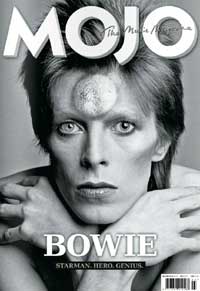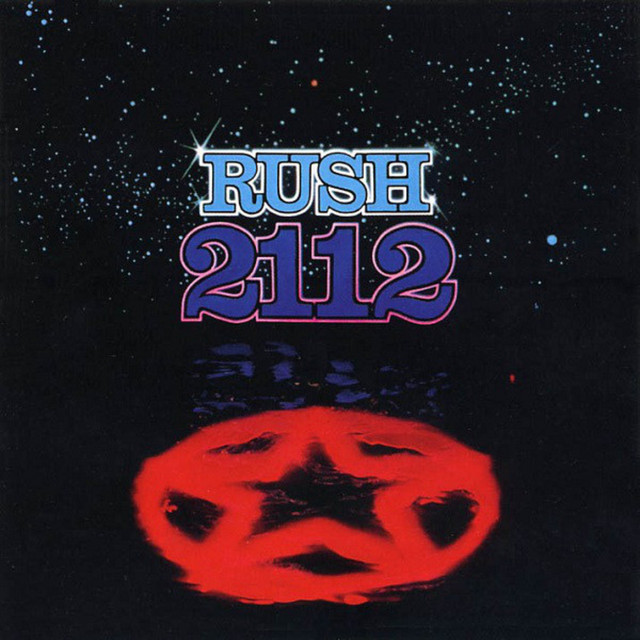Rush Make 2112, 1976
The Toronto heavy proggers felt like they were washed up after 1975's LP Caress of Steel. So they decided to go out in a blaze of glory, with an album featuring a side-long dystopian concept piece based on Ayn Rand's novella Anthem. What came next, they really weren't expecting...
By Paul Elliot, MOJO, March 2016

PART 1 "IT WAS A VINDICATION."
Rush voice Geddy Lee on identity crisis, cosmic totalitarianism and UK music weekly grief.
Our record company Mercury had told us in no uncertain terms that we were a huge disappointment to them. They had signed us on the basis of our first record [Rush, 1974], which was pretty straightforward hard rock. But we loved all those English progressive rock bands - Yes and Genesis - and on our third album Caress Of Steel we had a song that was 20 minutes, The Fountain Of Lamneth. Mercury was like, 'What the fuck? Who are you guys?' And even we thought that: Who are we?
Caress Of Steel had bombed. The gigs were half-empty. We named it the 'Down The Tubes Tour'. We joked about Neil [Peart, drummer] going back into the farm equipment business, and Alex [Lifeson, guitar] and I going back to painting movie theatres. When we started on 2112. We thought this would probably be the last record we make. So we were like: fuck you, Mercury. If we're going to go out, we'll go out doing our crazy shit, not failing at what you want us to be.
Neil wrote a story for the song 2112 based on Anthem by Ayn Rand. Neil's story was set in a futuristic totalitarian state, controlled by the priests of the temples of Syrinx. One day our hero finds a device. He's not sure what it is, but it has strings, and he figures out he can make music with it. He presents it to the priests but they shut him down because they want control over everything. He contemplates ending it all, because he doesn't want to live in a world that can't embrace such a thing that he's found...
 Neil showed us bits of lyric, and then we went to work at it. The whole thing came together very quickly - another 20-minute song-but it was so much more powerful and focused than The Fountain Of Lamneth. It felt really fresh to us, like we had figured something out. That was side one. It was heavy. So with side two we wanted to show diversity, an alternative version of the band. We had Tears, the pretty side of Rush, and A Passage To Bangkok, our pot-smoker song. We recorded the whole album in four weeks, at Toronto Sound Studios, which was owned by our producer Terry Brown. And it was fun - there was no desperation in the room. We were really proud of what we'd made.
Neil showed us bits of lyric, and then we went to work at it. The whole thing came together very quickly - another 20-minute song-but it was so much more powerful and focused than The Fountain Of Lamneth. It felt really fresh to us, like we had figured something out. That was side one. It was heavy. So with side two we wanted to show diversity, an alternative version of the band. We had Tears, the pretty side of Rush, and A Passage To Bangkok, our pot-smoker song. We recorded the whole album in four weeks, at Toronto Sound Studios, which was owned by our producer Terry Brown. And it was fun - there was no desperation in the room. We were really proud of what we'd made.
We didn't know what kind of feedback we were going to get from the record company. We were pretty afraid of that. Our manager didn't get it at all, and when he played it for Mercury everyone in the room was puzzled by it - except for Cliff Burnstein, who went on to manage Def Leppard and Metallica. Cliff thought the album was awesome, and for us that was so heartening.
Sales were slow at first. And then we had that terrible thing in England with the NME. 2112 was speaking out against totalitarianism, but the NME called us fascists. It made zero sense. Ayn Rand had a very controversial image as an anti-socialist and extreme right-wing capitalist, but that was a side of her work that was not of interest to us.
My father Morris and my mother Mary were both in Auschwitz for a time, so I was really deeply hurt by that NME story. At that time in Britain, the press was hunting down anything that sniffed of fascism. I can't blame them for that. But they got the wrong guys with us. I am not a violent type, but I wanted to punch the guy who wrote that. Definitely, I could have helped educate him.
In the end, what the NME said didn't matter. At first, 2112 was a slow seller, but when we went back on the road we were getting better gigs, even headlining some shows. It was a defining album. The artwork for the album by our friend Hugh Syme became a brand, it transcended the record and became very representational of us as a band. The album was a vindication. From that point, we were free to make our own mistakes."
PART 2 "A HUGE LEAP FORWARD"
Producer Terry Brown talks studio laughs, commercial second-guessing and sci-fi mind-stamping.
"I'm English, but in the mid-'70s I'd been living in Toronto for a number of years, and I'd been producing Rush since their first album. We were all disappointed that Caress of Steel didn't do better, but that wasn't something I ever discussed with the band. Things were moving at a pretty fast pace back then, and when it came to making 2112 we were all just focused on the creative process. I know the record company wanted something commercial. And the band wanted success - but not by compromising what they were doing.
They had a vision of where 2112 should go, and I think we achieved that. By the time we got to the studio, they had the material written and the basic structure for the album - the conceptual side, and then the separate tracks on side two. That 20-minute masterpiece itself, had a lot of substance and great dynamics in it. Also, it wasn't as dark as The Fountain of Lamneth. It was much more uplifting, and I think that made the difference. The science fiction story-line captured everyone's imaginations. And musically, that piece has some real keynote moments, especially the Overture which really stamped itself on one's mind indelibly.
I was also confident there was potential there for radio in some of the songs on side two. The Twilight Zone and Something For Nothing were all great songs. And I loved the intro in A Passage To Bangkok. It doesn't seem so politically correct now, but I thought it was a great little motif.
We had four weeks to do the whole record and we worked hard. We smoked a little dope when we'd finished a track and were listening back, but you don't want to become paranoid and paralysed when you're performing. We didn't have inordinate amounts of time to piss away smoking joints, that's for sure.
They're very funny guys, especially Alex, he's hilarious. But they were very serious about making a record, and such strong players. Geddy's vocals were stunning on 2112. Alex had such a cool approach to his soloing. And of course Neil was this powerhouse of a drummer. For me, as a producer, it was really a question of getting the best performances out of them, and as much energy as possible.
When we finished, I felt that this was a huge leap forward for the band. It was an album you could listen to over and over, because there was so much detail in it. I thought they'd nailed it, totally. Having said that, you never know what will make a hit. But these guys were always out on the road touring, and 2112 was such a dynamic song to play live. It always left the audiences wanting more.
I had a great working relationship with the band. I produced every Rush album up until Signals [1982]. But what 2112 did, at that time, was define what the band was all about. I listened to it recently and enjoyed it immensely. It's a great record."